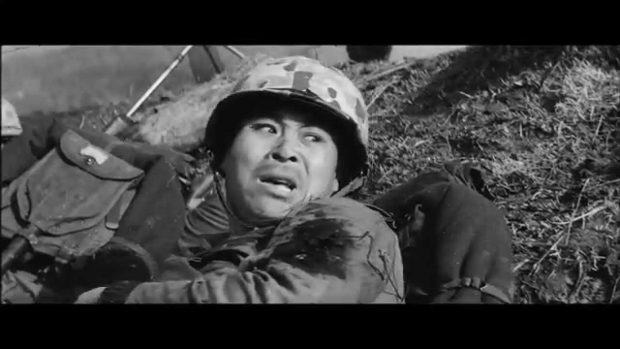[2020 평창영화제] 한국 전쟁영화의 시초 ‘돌아오지 않는 해병’

“다시 평화!” 2020년 6월 중순, 강원도 평창에선 2020평창국제평화영화제가 열렸습니다. 코로나19로 극도의 긴장과 우려 속에 엿새간 치러졌습니다. 전 세계 주요 영화제가 취소 또는 연기되는 가운데 코로나 사태 이후 처음으로 열린 평창영화제는 안팎으로 ‘성공적’이었다는 평가를 받고 있습니다. <아시아엔>은 이번에 선을 보인 34개국 96편의 영화 가운데 선별해 독자들께 소개합니다. <편집자>
한국 전쟁영화 장르는 이 영화를 통해 비로소 시작되었다고 해도 과언은 아니다. 이만희 감독의 대표작인 <돌아오지 않는 해병>은 전투 신의 스펙터클, 캐릭터들 사이의 전우애와 갈등, 반전과 휴머니즘의 테마 등 전쟁영화가 갖춰야 할 요소들이 황금비율로 배합되어 있는 작품이다. 실제 해병대원들이 동원된 액션 장면은 전무후무한 광경. “내가 없으면 누가 웃겨주니?”라는 구봉서의 유언은 영원히 회자될 명대사다. 전쟁이 인간에게 꼭 필요한지 묵직하게 묻는 작품이다.

The Marines Who Never Returned
It is not an exaggeration to say that the genre of war film in Korea began with this film. Lee Man-hee’s best-known work, The Marines Who Never Returned, has all the essential elements of a war film such as the spectacle of a battle scene, comradeship and conflict among characters and the theme of anti-war and humanism in a golden ratio. The action sequence where actual marines appear is an unprecedented sight. “Who would make you laugh when I am gone?“ are the dying words of the character played by legendary comedian Koo Bong-seo, and they make for one of the most memorable lines in Korean cinema. The film poses a heavy question asking us if human beings really need war.

이만희
1931년에 태어났다. <마의 계단>(1964) <만추>(1966) <휴일>(1968)등 수많은 걸작을 남겼다. 한국영화사의 천재 감독. <삼포 가는 길>(1975)을 유작으로 남기고 45세에 세상을 떠났다.
Lee Man-hee
Born in 1931. Directed The Evil Stair (1964) Full Autumn (1966) A Day Off (1968). Regarded as a genius in Korea film history. The Road to Sampo (1975) is his last film
Korea?1963?110min?Fiction?12





